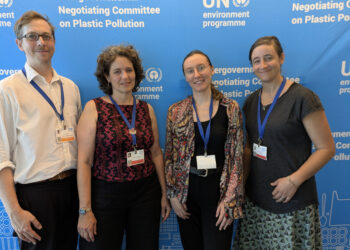In order to tamp down on plastic pollution, several environmental groups have worked together to launch a global database for tracking plastic-related laws. It even covers the upcoming United Nations plastics agreement.
Surfrider Foundation, the Plastic Pollution Coalition, Break Free From Plastic and the Environmental Law Alliance Worldwide created the Global Plastic Laws Database, a tool that can be used to “research, track, and visualize plastic legislation that has been passed around the world,” a press release stated.
It will organize legislation according to life cycle categories and nine key topics: microplastics, source reduction, design and reuse, extended producer responsibility, maritime sources of plastic, production and manufacturing, transparency and traceability, waste management, and waste trade.
The Plastic Pollution Coalition will be the project manager for the database, working with partner organizations to collect data from 115 countries.
“The unique dataset is input by individuals with native language knowledge and local, on-the-ground networks from across a diverse range of geographies,” the press release noted. “This process ensures the legislative data and resources are accurate, timely and relevant to a wide range of political and legislative systems.”
Surfrider Foundation is the data lead for the U.S. and has so far compiled a dataset of about 1,000 U.S. plastic reduction laws, primarily focused on policies aimed at reducing single-use bags, polystyrene, straws, balloons and cigarettes, the press release added.
The database will be updated regularly, the press release noted, “providing a way to monitor and identify emerging trends, solutions and policy innovations at local, national and international levels.”
“This is a valuable resource center for policymakers, organizations and advocates who are focused on designing effective policies to address the full life cycle of plastics,” the press release noted. “Businesses and banks may also use the database to find and understand current plastic regulations across their areas of focus; as well as educators, students, and researchers studying plastic policy; humanitarian organizations planning disaster response; and journalists covering plastic pollution and policy.”
It can also be of service while the United Nations negotiates the plastic pollution agreement through the end of 2024, and then to track compliance with the agreement moving forward, the press release added.





























